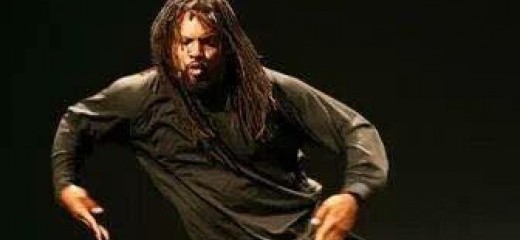
Photo: Bill Hebert
Owning Hip Hop: The Politics of Citizenship
by Gregory King
Pictured above and on homepage: Rennie Harris
S. Craig Watkins, in his book Hip Hop Matters, speaks of hip hop as a cultural movement committed to defying the cultural and political mainstream. He goes on to say that there has never been a consensus about its purpose, identity, or destiny. So how should the value of hip hop be measured? And, as an entity that, according to Watkins, lacks identity whom does it belong to?
On Tuesday January 26, 2015, as a part of the Dance Studies Colloquium Series hosted by Boyer College of Music and Dance at Temple University, Dr. Felicia McCarren delivered a lecture entitled Paris; Burning that focused on minority identity in France and the role dance plays in the definition of that identity. She began by explaining the arrival, assimilation, consumption, and importance of the hip-hop dance culture. A performance historian and cultural theorist, McCarren presented hip hop as a reiteration of socio-political ideologies and a regeneration of self. McCarren initiated the session by explaining the artistic and political landscape of France, giving insight into the origins of French hip hop (le hip hop) and how it has been used to represent integration and universalism in France. McCarren first clarified that, in France, the word “hip hop” refers primarily to dance as opposed to the other elements of dj-ing, mc-ing, and graffiti writing that are explored and nurtured in America. She asserted that, since these elements are not factors within the French context le hip hop should not be read or viewed through an American lens.
McCarren mentioned that, while le hip hop embraces American popular culture, it is not a simple consumption of that culture. The uniquely French identity of hip hop was formed by combining the improvised aspect of hip hop dancing with a concert-dance aesthetic, blending multicultural immigrant influences and high-tech performance quality.
I grappled with the thought that this represents a “new” aesthetic because Rennie Harris (Puremovement) has been bringing together cultures, coupling forms, and transitioning the street aspects of hip hop to the proscenium stage since 1992. Harris speaks of hip hop as a form he uses to explore universal themes that extend beyond racial, religious, and economic boundaries.
As stated on Harris’ website, he believes that, because of its transnational accessibility, hip hop can be used to bridge cultures and generations. Tell me again why France (or McCarren, at least) thinks this is new? – fresh? Maybe it can be argued that hip hop dance in America is still predominantly practiced in an improvised space but by no means does it live there.
Since emerging from the inner-city tensions of the South Bronx, exacerbated by the socioeconomic recession of the 1970s, hip hop has catapulted to international acceptance. McCarren explained that French politicians saw hip hop as a tool to address the marginalization of immigrant populations and with state funding—a strategic cultural policy that began under Francois Mitterand’s government—encouraged the teaching of hip hop to kids to aid with integration. While McCarren articulates the fact that the French interpretation of hip-hop culture is different in content, context, ideology, and representation, her argument overlooks the fact that the very forms that the French claim to have created existed in America.
I am concerned that French politicians, scholars, and hip hop practitioners—while paying homage to the history of hip hop in America—don’t seem to recognize that French hip hop dancers are doing what American artists have done for years. Acquisition of the form, imitating its rhetoric, keeping the name but reworking how it’s valued and represented in France, are not sufficient grounds for me to view French hip hop through a different lens.
Multi-layered in her presentation, McCarren successfully opened the dialogue around French hip hop and race, performance, and cultural identity. Bringing attention to hip hop as social text, McCarren laid the foundation for discussions about urban dance practices from both American and European perspectives.
By Gregory King
February 7, 2015

